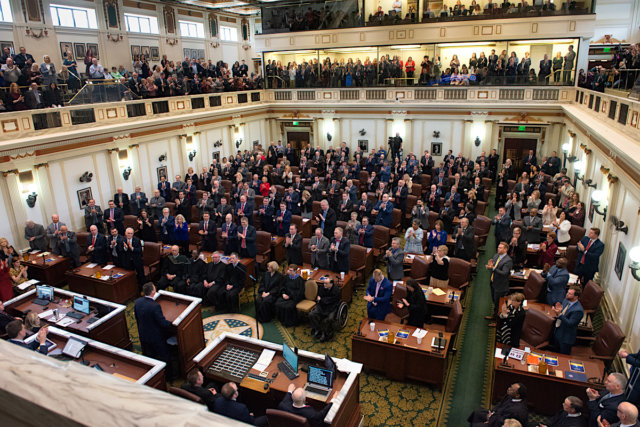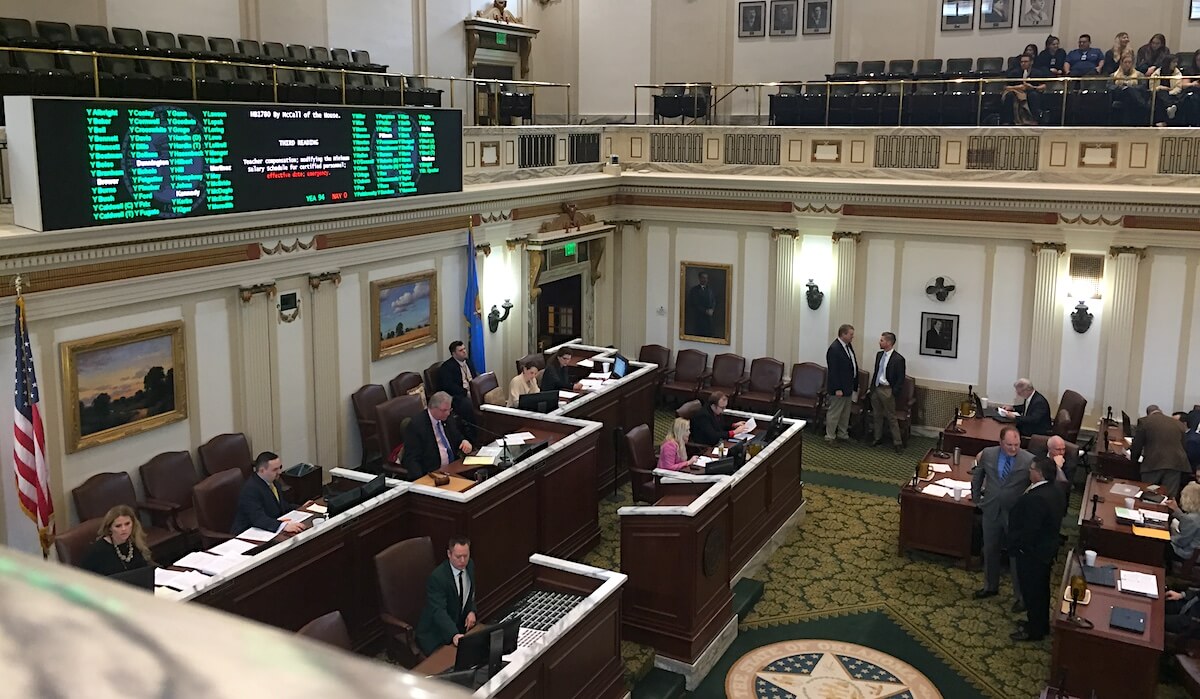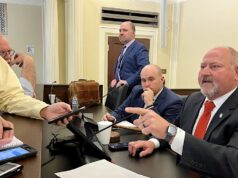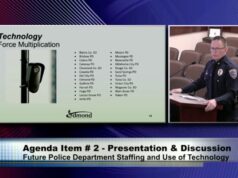

After four questions, four minutes of discussion and no debate, the Oklahoma House of Representatives unanimously advanced a $1,200 teacher pay raise this morning, sending Speaker Charles McCall’s HB 1780 to the Senate.
But what will happen to the education funding effort as it moves through the rest of the legislative process remains unclear.
“My caucus has been hearing a lot from constituents, teachers and others who are really advocating for more money just to go into the formula to help with classroom funding,” Senate President Pro Temp Greg Treat (R-OKC) said Tuesday in his office. “However, I signed onto the Speaker’s $1,200 teacher pay raise as the Senate author.”
Treat’s authorship simultaneously means he could push the pay raise through his chamber immediately or hold onto it during negotiations over other parts of a state budget that, practically, has at least $300 million in new revenue that could be allocated for the next fiscal year.
“Overwhelmingly on public education advocates’ chat boards, Facebook pages, I’m seeing time and again that they prefer classroom funding over the teacher pay, and I’m hearing that in my one-on-one meetings,” Treat said. “So that’s not to say people still don’t want to see more money going to their paycheck. But I think if they have their druthers, it goes to the classroom, from the feedback I’m hearing.”
Putting more money into the state education funding formula could allow districts to hire more support staff or hire more teachers to reduce class sizes.
House Majority Leader Jon Echols (R-OKC) said Tuesday that he believes the Legislature can provide funding for both those education components.
“I don’t believe in pitting the two against each other, if that makes sense. I think we’re going to have to find a way to do both. This (pay raise) is going to be around $80 million,” Echols said. “I think there needs to be more money put in the common education budget than just $80 million this year. So I think you have the opportunity to do two things. I don’t think you have to pick between the two.”
While Echols estimated the $1,200 across-the-board hike to the minimum teacher pay schedule would cost about $80 million, Gov. Kevin Stitt wrote the number as $60 million on his white board Wednesday.
“That’s already moving through the House well, and I’m looking forward to continuing to promote that,” Stitt said. “We’ve got to let our teaching profession know that they’re valued.”
Stitt called for the $1,200 raise in his State of the State address, which included about a $96 million increase for common education funding in his proposed executive budget.
“Over the next few years, we will move the needle in outcomes. We will set high standards. We will enact reforms. We will invest in the classroom.” Stitt said in his speech Feb. 4. “But we must first continue our investment in the teacher, because it’s not programs, curriculum, or resources that students will remember. The magic happens between the student and the teacher in the classroom.”

Wallace: ‘This is the beauty of the building’
The magic of the Oklahoma State Capitol, however, involves budgetary negotiations between the governor and two chambers of the Legislature.
“This is the beauty of the building. All three have to agree or nothing happens. The Legislature passes bills, and the governor (signs or) vetoes,” House Appropriations and Budget Chairman Kevin Wallace (R-Wellston) said Tuesday. “Right now, bills are just working through the process. Both the Senate has bills and the House has bills. (…) At the very end of the process, the negotiations will decide what bills will be passed with title on and sent to the governor and how the budget will come together.”
While they hold the minority in the House and Senate, Democrats are attempting to shape those negotiations as well.
“My sugar-momma wife is a public school classroom teacher, and I know our family would appreciate a pay raise, but I am mindful that our state does not have unlimited resources,” Rep. Andy Fugate (D-Del City) said during HB 1780 House floor discussion on Thursday. “I’ve heard from teacher after teacher that what is effectively a $60-per-month pay raise after taxes will mostly just go back into classrooms because those teachers want to be successful. They see the opportunities that exist in their classrooms, and they are desperate for the tools to reach those kids. So do you happen to know if there are other plans in this body as we go forward to pass legislation to put money into their classrooms?”
Rep. Rhonda Baker (R-Yukon) presented HB 1780 and answered Fugate.
“You are right, that is a discussion teachers have focused on,” Baker said. “I do want to say, yes, as we move forward and budget negotiations continue, that will be something that will be discussed at that time.”
On Thursday’s floor vote, Fugate initially took constitutional privilege — a designation reserved for members who have conflicts of interest on legislation before changing his mind and voting in favor of the teacher pay raise.
Follow @NonDocMedia on:
Dunnington: Policy ‘creeping’ into #oklaed funding talks
Rep. Jason Dunnington (D-OKC) said Wednesday that the proposed $1,200 teacher pay raise stems from an important commitment that lawmakers made during last year’s teacher walkout after the Legislature had already raised the minimum educator pay by about $6,000 and added about $50 million into the funding formula.
“I think it would be inappropriate for us to not do a step two at all. But I would equally say we should prioritize getting more funding into the classroom on per-pupil spending,” Dunnington said. “So I would say that they are not exclusive. In many ways, both of them need to be done, and that could have us in a difficult conversation of, ‘Do we have enough revenue to do both of those and increase spending on other core services that have been neglected as cuts have been made?'”
Dunnington said Democrats and Republicans are mostly on the same page about the issue, but he added “the caveat that there has been introduced into this conversation some education policy that deals with vouchers and other kind of anti-public education policy that have slowly been creeping into the conversation.”
One of those measures is SB 901, filed by Treat, to expand the Lindsey Nicole Henry private-school scholarship program to cover homeless children. Treat said about 27,000 students statewide are homeless and could receive more options for their education if the bill becomes law.
“Educational opportunity is essential to unlocking a student’s potential,” Treat said in a January press release. “The Lindsey Nicole Henry scholarship program has been wildly successful in helping students with special needs receive the support and opportunity to enjoy a fulfilling education. Homeless students face tremendous obstacles. Giving them access to this scholarship program is a great way to help them overcome those hurdles by getting an education that hopefully could help them become a transformational generation in their family tree.”
SB 901 advanced out of the Senate Education Committee by a 10-7 vote Tuesday.
Treat also advocated for SB 441 to require that school districts who have transitioned to four-day school weeks prove that the their decision has not negatively affected student performance and that it has produced cost savings. The bill advanced 11-6.
“The original reason we went to hours rather than days was because some catastrophic weather events throughout Oklahoma to give the school districts more flexibility on that,” Treat said. “Since then, there’s been a narrative that it is lack of support from the Legislature being the reason [districts] had to go to four-day school weeks. But if you look at a lot of cases — I’m not going to say all of them — it’s got hardly anything to do with the money, and it’s definitely not about student achievement.”
Treat said SB 441 about five-day school weeks is a part of the GOP Senate Caucus’ platform.
“When you get down into the weeds of it, a lot of [school administrators] will say it deals with teacher recruitment, different things like that,” he said of four-day school weeks. “A lot of them still have their school building open for the fifth day for different things. In many instances, it’s not even a savings on the utility bills.”




















